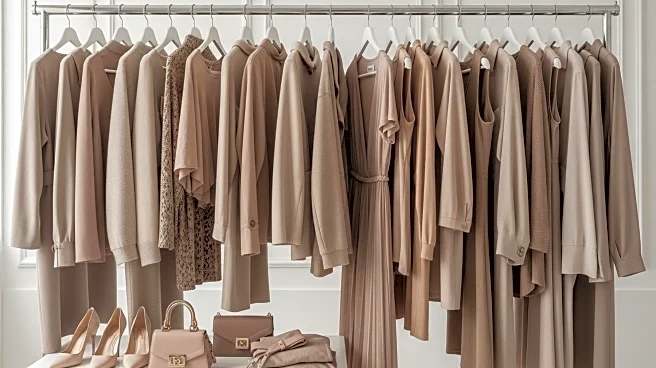What's Happening?
The RealReal has released its eighth annual resale report, revealing significant shifts in consumer behavior within the fashion industry. According to Kristen Naiman, The RealReal's Chief Brand Officer, resale has transitioned from a secondary shopping method to a primary way people engage with fashion. The report highlights dramatic increases in searches for brands following creative changes, such as Loewe and Balenciaga, while brands like Coach and Ferragamo have seen substantial growth without recent creative shifts. Naiman emphasizes the cultural impact of resale, noting that it allows consumers to engage with fashion in a non-linear way, unbound by traditional seasonal cycles. This shift reflects a growing preference for fashion items with history and provenance, rather than new, logo-driven pieces.
Why It's Important?
The findings from The RealReal's report underscore a broader trend towards sustainable and conscious consumption in the fashion industry. As consumers increasingly prioritize the environmental and cultural impact of their purchases, the resale market is becoming a crucial component of the fashion ecosystem. This shift could lead to significant changes in how brands approach design and marketing, potentially reducing the emphasis on fast fashion and encouraging more sustainable practices. The rise of resale also suggests a growing demand for unique, well-lived items, which could influence future fashion trends and consumer expectations.
What's Next?
As the resale market continues to grow, fashion brands may need to adapt their strategies to align with consumer preferences for sustainability and provenance. This could involve increasing their focus on quality and durability, as well as exploring partnerships with resale platforms to extend the lifecycle of their products. Additionally, the shift towards resale may prompt brands to reconsider their production cycles and marketing approaches, potentially leading to a more sustainable and culturally rich fashion industry.
Beyond the Headlines
The cultural shift towards resale reflects deeper societal changes in attitudes towards consumption and ownership. As consumers become more aware of the environmental impact of their choices, the fashion industry may see a rise in community-driven and circular economy models. This could foster greater collaboration between brands, consumers, and resale platforms, ultimately leading to a more inclusive and sustainable fashion landscape.










